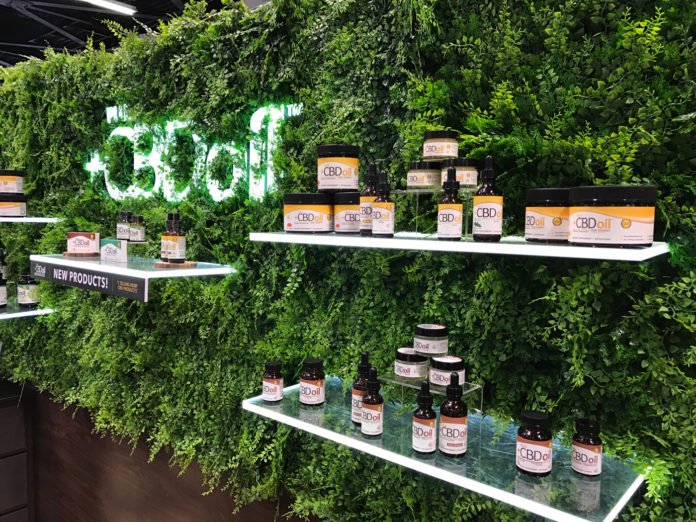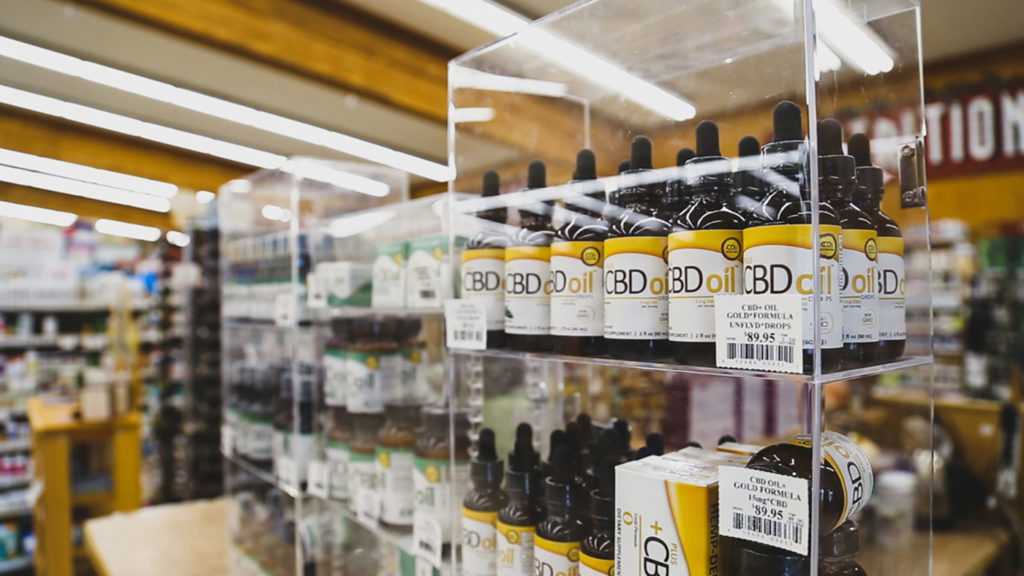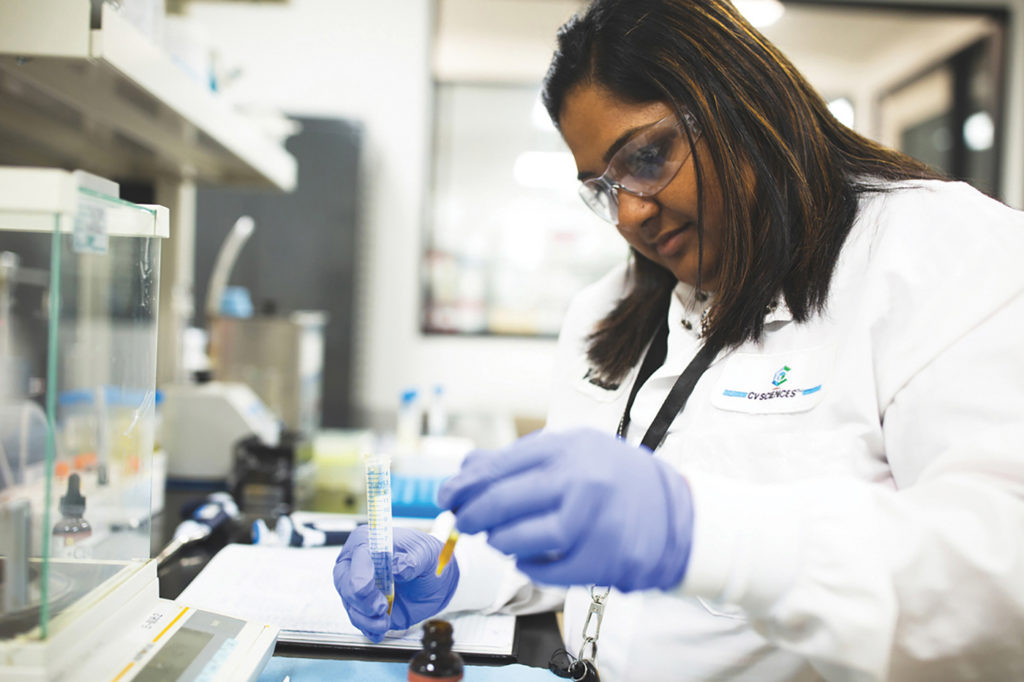In the crazy world of hemp, a company can be a success and still face significant market headwinds even as analysts give a tentative thumbs up to its stock. Such is the case with CV Sciences, which for the past several months has been trading on over-the-counter markets in the $4-$6 range. The company reportedly is eyeing a NASDAQ up-listing following last year’s triple-digit revenue gains, $34 million in revenue, and $24 million in gross profit. With a market cap around $470 million, CV Sciences may not garner the headlines of multi-billion-dollar cannabis stocks like Canopy Growth, Tilray, and Aurora, but it has received renewed interest following passage of the 2018 Farm Bill in December and is considered one of the top three hemp stocks to watch in 2019.
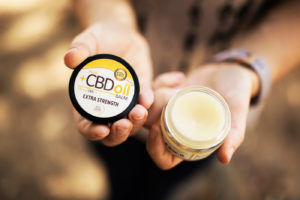 Headquartered in Las Vegas with offices and operations in San Diego, the company runs two distinct business segments: a pharmaceutical division working to develop CBD-based therapeutics and a consumer division that manufactures, markets, and sells hemp-derived CBD products into a range of market sectors. In operation since 2012, the company has cultivated deep roots in the natural products retail space, where its suite of fifty-plus SKUs under the PlusCBD Oil brand—encompassing capsules, concentrates, sprays, softgels, balms, drops, and gummies—are available in more than 3,300 independent stores nationwide.
Headquartered in Las Vegas with offices and operations in San Diego, the company runs two distinct business segments: a pharmaceutical division working to develop CBD-based therapeutics and a consumer division that manufactures, markets, and sells hemp-derived CBD products into a range of market sectors. In operation since 2012, the company has cultivated deep roots in the natural products retail space, where its suite of fifty-plus SKUs under the PlusCBD Oil brand—encompassing capsules, concentrates, sprays, softgels, balms, drops, and gummies—are available in more than 3,300 independent stores nationwide.
According to SPINS, a syndicator of data and insights for the natural, organic, and specialty products industry, PlusCBD Oil is the top-selling brand of hemp-derived CBD on the market. The products are made from globally certified agricultural hemp seeds grown in Europe. Per the company’s June 2018 sourcing guide, “PlusCBD Oil products never contain more than 0.3 percent THC on a dry weight basis and do not contain any synthetic substances or derivatives.”
While essential to the company’s fortunes, passage of the Farm Bill did not affect its entire business. “It has no impact on the pharmaceutical side, which is a very highly regulated process,” said CV Sciences Chief Executive Officer Joseph Dowling. “You go straight through the front door of the FDA. The process is very well defined in terms of preclinical work, clinical work, and so forth. The Farm Bill only relates to the consumer packaged goods or consumer products side of the industry.”
Dowling said he is interested in neither farming nor processing, each of which require massive investment in order to scale. Instead, he said, “We negotiate good toll rates, get the oil, and then we do specialty high-value-added processing that doesn’t require high [capital expenditure].
“We kind of follow the Coca-Cola model,” he added. “Coke is a product-development, marketing, and distribution company, and that’s what we are. They use bottlers and copackers. They said, ‘You know what, there are others that do that. Let them take the risk on investment. They can bottle for other people, bottle for us, and we’ll leverage our name and our size to get the best toll rates. We’ll stay out of that business and focus on what we do best.’”
Not an overnight success
Approached by a recruiter four-and-a-half years ago to join CV Sciences, Dowling was at first reluctant to enter the nascent hemp parade. He had worked in banking, mergers and acquisitions, technology, and Wall Street, and more recently spent ten years in the life sciences industry, working on drug formulation and delivery. “We licensed our technology to global pharmaceutical companies like Pfizer, Merck, and Boston Scientific,” he said.
Dowling brought deep organizational and operational skills to the table. “I have the type of heavy science discipline you don’t typically see in the consumer product, nutritional supplement space,” he said. Of the CV offer, he said, “My first reaction was, no, I’m not doing that.” His wife convinced him to take the interview. “I ended up getting along very well with the CEO and began to see that this was potentially a very significant opportunity. Back then it was very risky. No one knew what was going to happen, and no one knew when it would happen or if it would happen. Or that we would be in this crazy minute-by-minute environment we find ourselves in.”
The chief executive officer at the time was Michael Mona Jr., a Las Vegas native who founded the company in 2010. Mona changed the name from Foreclosure Solutions Inc. to CannaVEST Corp. in January 2013 and undertook another rebranding in 2016 with CV Sciences and a new trading ticker. Dowling served as chief financial officer until June 2018, when Mona left the company and its board of directors. Dowling, who assumed the position of chief executive officer while remaining chief financial officer, also was appointed to the board of directors, and Michael J. Mona III became president of the company.
To really compete, you have to have a brand that is respected and trusted, and then you have to have scale.
—Joseph Dowling, chief executive and financial officer, CV Sciences
Despite some legal tangles, disagreements between Mona Jr. and the Securities and Exchange Commission, and questions regarding the depth and breadth of competition in the emerging U.S. hemp market, management insists the company has developed a foundation of efficiency that will hold it in good stead far beyond the next few years. According to Dowling, building that foundation has been a lengthy process.
“The 2014 Farm Bill was passed with a provision that defined industrial hemp and provided the legal framework we’ve been operating under for the past four years,” he said. “Now, the 2018 Farm Bill significantly solidified that legal framework, taking away from the [Drug Enforcement Administration] the jurisdiction over this plant, at least for hemp as defined under the provisions of the bill.
“The things that matter now are branding and scale,” said Dowling. “Of course, you’ve got to have quality; that’s a given. But you have to demonstrate to the big boys that you can do this at scale under GMP [good manufacturing practice] conditions with the highest level of quality assurance and customer service, with traceability from seed to shelf, with no safety issues with your product, with your claims backed up by science—and I’m referring to our toxicology study that resulted in our self-affirmed GRAS [generally recognized as safe by the Food and Drug Administration] status. If you can’t say what I just said in this last sentence, it’s going to be hard to achieve scale. People want to deal with the most adult organizations, and the most adult organizations are going to be the ones that have made these kinds of investments, because that’s how big companies operate.”
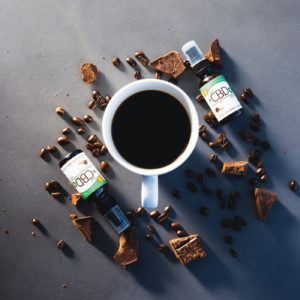 In this new world, companies “have to have those things in place,” he added. “They audit their suppliers and vendors. Especially with an ingredient this controversial, they’re not going to deal with the guys that are black market converts; they’re not going to deal with guys that are small-scale or operating out of their garage. They’re not interested in what I call PG, or pretty good, manufacturing processes. They want the real deal, and it’s hard to get there.
In this new world, companies “have to have those things in place,” he added. “They audit their suppliers and vendors. Especially with an ingredient this controversial, they’re not going to deal with the guys that are black market converts; they’re not going to deal with guys that are small-scale or operating out of their garage. They’re not interested in what I call PG, or pretty good, manufacturing processes. They want the real deal, and it’s hard to get there.
“Our growth for the second quarter of 2018 was not an overnight success, but the result of us doing things right for the past four-and-a-half years, planting more than just seeds but plowing the fields,” continued Dowling. “When it was hard to do things right, we consistently did them right, and it paid off. If you would have looked at maybe Q3 of 2017, you would have seen signs of [momentum]; if you looked at Q4 of 2017, you would have seen it was going to be something. Q1 [2018], same thing, and then boom, Q2 2018, and it all came together, all that momentum in the market, and we were the one that invested all the way through.”
Regarding the company’s reach into the natural products, independent-store world, Dowling refuted the notion these are relatively insignificant chains in the retail scheme of things. “We’ve got 100-store-count chains that are public companies that have a billion dollars,” he said. “Is that mainstream or is that closer to Sprouts, which I consider mainstream? It’s not Vons or Ralph’s, but it’s close.”
Knowing
Stuart Tomc, vice president of human nutrition, was hired at precisely the same time as Dowling. He had worked in the dietary supplement space for most of his career, including as spokesperson for Nordic Naturals, which he said was the largest fish oil company on the planet and the number-one-selling fish oil in every health food store in the country. “I was recruited in 2014 to build the PlusCBD Oil product line and launch our product footprint into the natural products industry,” he said. “Ever since, I’ve been on the road.”
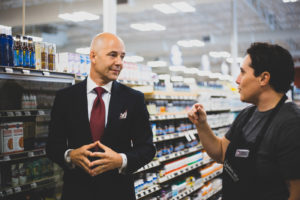 Tomc brought a few other people from the natural products industry with him to see what they could do with this exciting new market segment. “We took this genius idea [CBD oil] and shaped it for the health food store community, which I look at as the ocean. People say, ‘Well, what should the design of the boat be?’ Don’t worry. The ocean will tell you which boats succeed and which sink.
Tomc brought a few other people from the natural products industry with him to see what they could do with this exciting new market segment. “We took this genius idea [CBD oil] and shaped it for the health food store community, which I look at as the ocean. People say, ‘Well, what should the design of the boat be?’ Don’t worry. The ocean will tell you which boats succeed and which sink.
“I knew there was a unique and specific cannabis culture different than the low-to-no-THC, high-CBD hemp culture and different from the pharmaceutical culture,” he continued. “Different products, different markets, and different customers. I knew most people who work in health food stores became interested in the power of plant medicine when they first discovered cannabis. I knew there would be a logical progression if we could package it, message it, and label it without any reference to bongs, songs, Cheeches, or Chongs.”
Time proved him correct. Health food stores have stuffed large cases with CBD products. “It was already a competitive landscape two years ago,” said Tomc, who believes the public knowledge base about CBD products is “infinitely farther ahead than ivory-tower, white-hat, white-coat, white-shoe people care to admit.”
These stores auger the future of CBD engagement, he said. “Independent health food stores, where people are driven through circumstance rather than through virtue to find ways to help take care of themselves, is where you find the best experimental audience in the world when it comes to new things that could help them feel better.”
According to SPINS, a syndicator of data and insights for the natural, organic, and specialty products industry, PlusCBD Oil is the top-selling brand of hemp-derived CBD on the market.
Independent retail is an unforgiving business environment, added Tomc, especially when shelves already are lined with thirty products. “They ask three questions when you bring in your new line,” he said. “‘Is it half the price?’ No. ‘Is it twice as good?’ No. ‘Can I make a bigger margin on it?’ Yeah. ‘Okay!’ My point is that getting into a health food store [in 2018] was nearly impossible, and the only thing harder than getting into a health food store is staying in a health food store.”
That bodes well for CV Sciences, which he called a “darling” of INFRA, the Independent Natural Foods Retailers Association. The strength of the company’s brand in independent stores will help when it comes to big box retail and gaining share from online sales. Tomc pointed to 2018 research data from the Brightfield Group indicating increasing strength in brick-and-mortar retail could make the sector a market leader in the sale of hemp-derived CBD specifically.
“Though still important, online sales are no longer the largest hemp distribution channel in 2018,” the report stated. “Today, natural food stores host 29 percent of sales, versus 24 percent that flow through online platforms and 23 percent through smoke shops. By 2022, chained retailers are expected to move 64 percent of sales, followed by natural food stores with 15 percent and online sales with 12 percent.”
CV Sciences is poised to deliver. “We have enough quantity to meet current demand and are expanding to meet what we think is going to be significant demand in the future, and it’s going to be mainstreamed,” said Dowling. “Every food, drug, and mass retailer at the highest level is trying to figure out not if but when they are going to introduce these products on their shelves.
“I’ll take it a step further,” he added. “If you’re one of the big drugstore chains or some of the other bigger regionals—eventually, do you think they will become [medical cannabis] dispensaries? … Why would they sit back and let these other guys control a $100 billion industry?”
Let them have it, said Dowling, who calls the cannabis business “fragmented” because of the state-by-state nature of its regulatory structure. “[The CBD industry is] not fragmented, and we have an opportunity to scale and to really do this to mainstream retailers and other distribution points,” he said.
“To really compete, you have to have a brand that is respected and trusted, and then you have to have scale,” he added. “If you don’t have those two things, you’re not going to be able to compete, and we have both. We are the only company with true fundamentals. We’re profitable. We have cash flow. We’re undervalued compared with some of the THC pot stocks. We’re more profitable than Tilray, and they would say their growth potential is off the charts. We think ours is, too.”

